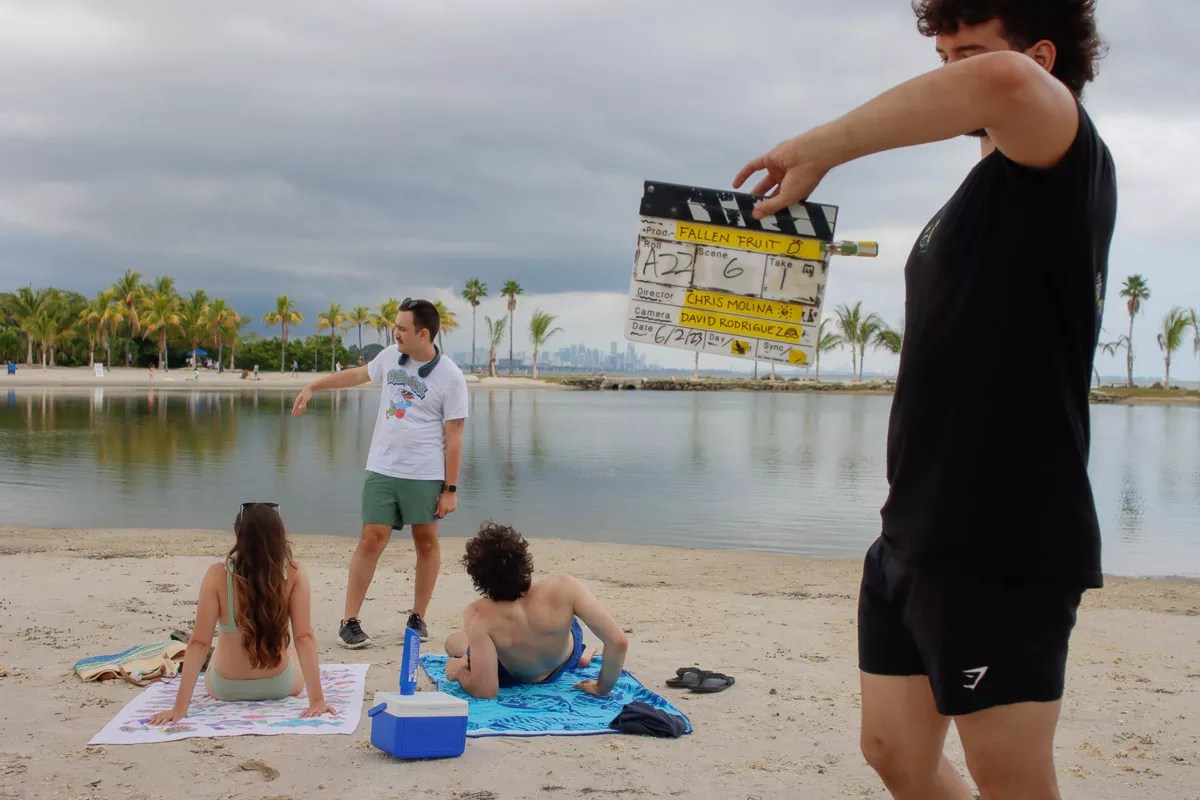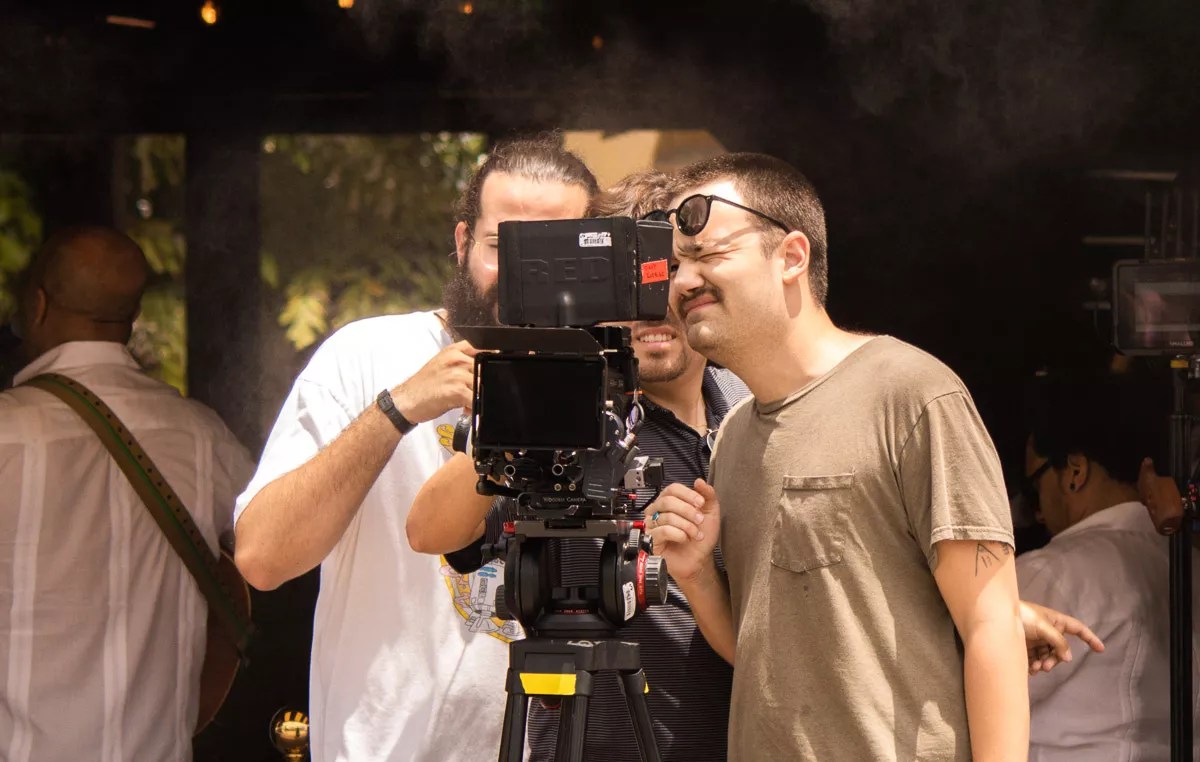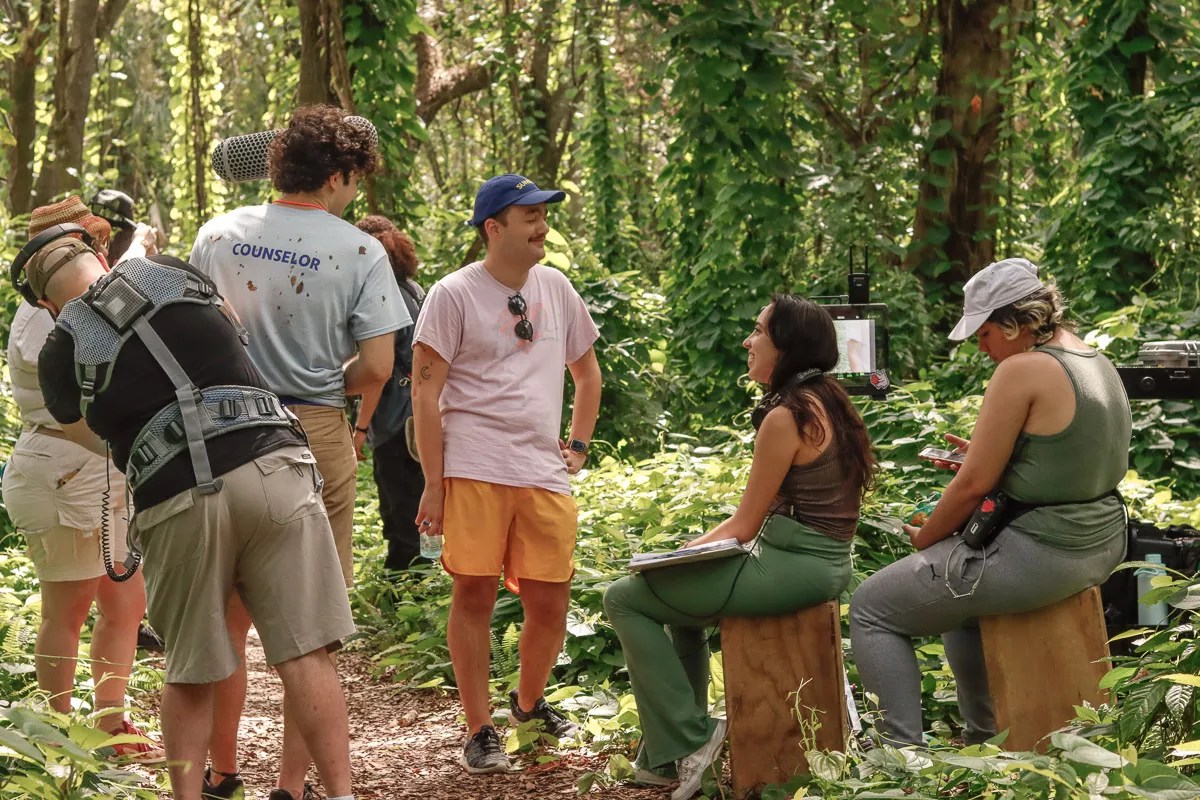
Photo by Ana Karen Garro

Audio By Carbonatix
If you’re a filmgoer or filmmaker in South Florida, there is a good chance you’ve run into or heard of Chris Molina. He’s worked for and with a dizzying number of film organizations in the area, from Borscht Film Festival to the Flaming Classics film series. He’s a festival fixture, going from a theater manager to shorts programmer at the Miami Film Festival to founding two festivals, Sun Pass and Anita Film Festival, which highlight local and queer filmmakers. He was named “Best Film Director” by New Times in 2022 and, the following year, won an Oolite Arts Cinematic Arts residency, which funded the production of a microbudget film.
Now Molina is adding feature film director to his résumé with his debut Fallen Fruit, which had its world premiere and two sold-out screenings at this year’s Miami Film Festival. If you failed to snag a ticket to its premiere, you’ll have another chance when the film screens at Outshine Film Festival‘s Cocktails & Cinema event on Tuesday, April 23.
Fallen Fruit is a coming-of-age meets quarter-life crisis story about Alex, who untriumphantly returns to his childhood home after a bad breakup. Trying to get his life back on track, he endures trials and tribulations – unemployment, STIs, and a hurricane. At the heart of Molina’s film is a love-hate relationship with the City of Miami, to which many residents can relate.
Ahead of Tuesday’s screening, New Times spoke to Molina about his film and his relationship with Miami.
New Times: How does it feel after a world premiere and two sold-out screenings in your hometown?
Chris Molina: Having my world premiere sell out two times over in my hometown feels unreal. To even play the festival is a dream come true, so to have such a successful premiere and positive reception has me on cloud nine.
Speaking of hometowns, Miami can be a harsh place to live, especially for artists. Fallen Fruit captures a love-hate relationship with the city. How do you reconcile those two emotions, and what about the city helped you grow as a filmmaker?
Miami can be such a harsh place to come of age, especially as an artist. It constantly feels like the city is conspiring against you, from lack of resources and unaffordable rent to the weather. Being a filmmaker in Miami feels like I’m playing the industry in hard mode compared to my friends living in major film hubs. But these harsh conditions force us to lean on each other, forming such a loving, supportive film community, and to really be sure that this is what we want to do forever.
On a more personal level, this is where my grandparents immigrated, it’s where my family is, it’s where my friends are. These are the people who keep me going. Nothing feels more right than lying down, looking up at palm fronds. Why shouldn’t I be able to enjoy these simple things while crafting a film career? I can have it all.

Despite his work being autobiographical, filmmaker Chris Molina hopes audiences see themselves in his work.
Photo by Ana Karen Garro
Why the title Fallen Fruit?
Mangos are the ripest when they’ve fallen, and I think people are the same way. It’s when we’re down and out that we’re the ripest for change and growth.
One of your first films, Is That All There Is?, is boldly autobiographical. How autobiographical is Fallen Fruit, and do you see it as a continuation or departure from your previous work?
All my films, at least so far, tend to be incredibly autobiographical – I don’t really know how to be an artist any other way. That said, I think it’ll be easy for people to try and find the throughline through all my films and how they relate back to my own life. In being as boldly vulnerable as I am, I hope that it doesn’t lead to that kind of speculation, but rather, the audience sees themselves in my work and finds connections to their own lives.
Did you ever consider casting yourself in the lead role? What was the process like casting and working with your actors as a first-time feature filmmaker?
I never considered casting myself, although I’m an alright actor. I knew the magnitude of this project compared to other work that I’ve done and knew how difficult it would be to lead a set while revisiting these memories. The film was better off without me in there. I think Ramiro brings something so special and thoughtful to the film, something I wouldn’t have been able to bring this first time around directing a feature film set. The same goes for Austin.
Casting is a lot like dating, where you see person after person, and then just when you’ve lost hope, the right person comes out of nowhere. They get the character so deeply and end up bringing something you could have never thought the film needed. I’m so lucky my first movie got to be with these actors.
Your main character, Alex, is exceedingly ordinary. How does Alex differ from contemporary queer characters or those you grew up watching to you?
I very purposefully made a queer movie where the lead character is not coming out. Don’t get me wrong, I sob every time I watch a teen boy come out to his mom, but the queer experience doesn’t stop there. I really wanted Alex’s experiences to mirror those of my friends and me – a fairly normal life filled with cringey and regrettable choices. I hope it can prepare some other queer for their experiences beyond coming out.

With Fallen Fruit, filmmaker Chris Molina wanted to explore the queer experience beyond coming out.
Photo by Ana Karen Garro
What were you excited to show in Fallen Fruit that you think is underrepresented in queer media?
Beyond this film not being a coming-out story, I’m not looking at Fallen Fruit as a competitor to other queer media. My greatest hope is that it can fit nicely in the ever-growing tapestry of queer filmmakers telling ordinary tales of queer life. I’m so excited to play my film amongst other queer filmmakers and exchange notes.
In addition to making films, you run and program film festivals. How does one practice inform the other?
Programming films in Miami has made me hopeful for the future of film down here. My job has gotten much harder recently – in a great way – with so many great Florida filmmakers submitting their work. I can only hope that they’re as stubborn as I am and refuse to leave.
You are known for your love of karaoke, which is featured in the film. There is a long history of compelling karaoke scenes in films like Lost In Translation, When Harry Met Sally, and Only God Forgives, among others. What about karaoke appeals to you cinematically and what is your signature number?
My résumé should read filmmaker first, karaoke artist second.
Karaoke is such an amazing, vulnerable act, and maybe that’s why I find myself drawn to both it and filmmaking. Singing in itself is something we rarely, if ever, do in front of others. That’s already vulnerable. But to then belt a song that speaks to the deepest depths of your soul three beers in? We’ve all been taught to bottle everything up, especially men. So when we get the chance to let it all go, of course, it’s going to be beautiful and courageous. In that sense, it’s so naturally cinematic. With that being said, my signature number is “Be Our Guest” from Beauty and the Beast. It’s not incredibly soul-bearing, but I won $200 at a karaoke contest a year ago because of it.
What is your absolutely essential hurricane supply?
A giant drag-brunch fan. Nothing is worse than being stuck at home with no power during a Miami summer.
Fallen Fruit at Outshine Film Festival. 7:30 p.m. Tuesday, April 23, at Silverspot Cinema, 300 SE Third St., #100, Miami; outshinefilm.com. Tickets cost $15. Streaming April 29-May 5.